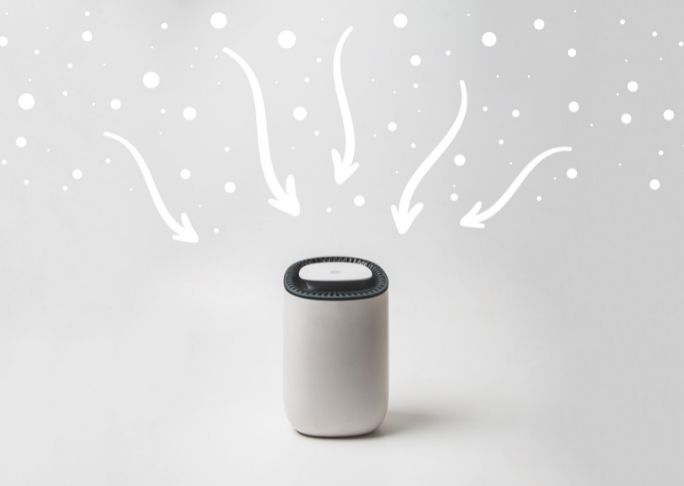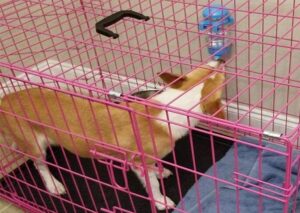If you’re a dog owner that loves sleeping together with your pet, whether in the same bed or the same room, you may discover that your pet snores. Snoring can disturb your sleep and may also prevent your dog from resting properly at night. Therefore, this article will show you how to stop a dog snoring quickly.
First of all, why do dogs snore?
Table of Contents
Why Is My Dog Snoring?
The cause of snoring in dogs is the same as in humans – nasal passage and nostril obstruction. This obstruction, in turn, is caused by several other factors, which include obesity, tobacco, and allergens.

This post contains affiliate links. However all the information provided on this site are my own honest opinions. See more in Disclaimer.
Can Obesity Cause A Dog To Snore?
When your pet is overweight, there’s likely to be excess tissue build-up in their neck and throat. As your pet lies down to sleep, this tissue collapses and causes your dog to snore.
Effects Of Tobacco And Smoke Build Up
For dogs with sensitive throats and sensitive necks, snoring can be caused by smoke build-up from tobacco. So, your dog might be snoring because you smoke around your pet.
Can Pet Allergies Cause Snoring?
If your dog suffers from allergies and reacts to other common allergens like dust, smoke from other sources, pollens, human dander, and more, it can affect the nasal passageway and cause your pet to snore.
Are There Natural Causes Of Dog Snoring?
Your pet’s snoring can also be natural, i.e., relating to his breed. Some dog breeds are prone to snoring because of their shape.
Now you know some of the reasons why your dog snores, here’s to stop your pet from doing it;
How To Stop A Dog Snoring During Sleep
There are several things you could try to stop your dog’s snoring problems. These techniques could involve using specialized tools or simple things you can try at home that does not cost anything. Let’s look at them below.
1. Use A Circular Bed Or Pillow To Stop Dog Snoring
Dogs are encouraged to sleep in a curled-up position to prevent them from snoring. When curled up, less pressure is applied to their esophagus, and air passages are opened for better airflow.
In a straight bed, it’ll be difficult for them to maintain a curled-up position once they fall asleep. Meanwhile, a circular dog bed will encourage your dog to sleep in a curled position.
If your dog must sleep in a straight bed, ensure that you put a pillow under his head or go for a dog bed with a headrest built-in. The right pet bed will keep your dog’s neck straight so there’s easy airflow in his throat.
If your dog does not sleep in a dog bed, see our post on how to train your dog to sleep in a dog bed here. Also, see our post on big barker pillow top dog beds as they provide the right type of support for dogs.
2. Use An Air Purifier Or An Air Humidifier
Air purifiers and humidifiers are devices that help improve the quality of air in a room. However, they perform different functions.
Air Humidifiers
Air humidifiers add moisture to the air, preventing dryness and humidity, freshening the air in the process.
As your pet breathes air with sufficient moisture, the airways are sufficiently lubricated, increasing airflow. With improved airflow, snoring is less likely to happen.
Air Purifier
Air purifiers work differently. Air purifiers clean the air by moving the air in the room through a series of filters trapping allergens, dust, and contaminants improving the air quality drastically.

When the air is cleared of toxins and allergens by the air purifier, you and your pet will breathe easier and better, and snoring is not likely to happen as the air is pure. See our list of the best air purifiers for pets here if you are interested in this option. The article analyzes the different filters in the air purifiers and what to look for when ordering an air purifier.
If you need to pick between the two, we recommend air purifiers as they are more effective than humidifiers. Some people choose to have the two in their homes.
3. Keep The Sleeping Area Clean
Once again, if your pets’ snoring is due to allergens, cleaning the area where he sleeps and spends time will positively affect his snoring problem.
Dirt and dust are common allergens that are also regular when an area is unkempt and not cleaned regularly.
You should vacuum the carpet and curtains regularly while washing the beddings at least once a week; twice a week is best.
Trending in Dogs:
You can use a handheld pet vacuum or a normal one to clear out fur and dust from hard-to-reach places as dust travels high up, even to areas you and your pet don’t use regularly.
Also, dry the beddings under sunlight at least once a week as this helps kill bacteria. While ensuring your pets’ sleeping area is clean, you should ensure you keep your pet clean as well by bathing as needed. See our post on the best dog shampoo for allergy sufferers and the best dog clippers great for allergies and dander.
4. Monitor Your Dog’s Weight
An overweight dog is in danger from a lot of health issues. Snoring is one of the minor problems your dog may be facing. Therefore, you have to monitor your dogs’ weight if you want to stop him from snoring and keep him safe from the complications of obesity.
You can prevent your pet from being overweight in many ways. One of the most effective is by exercising. Your pet should exercise for 30 minutes to 2 hours every day.
According to AKC, if your pet is obese, you should vary his exercises by increasing and decreasing the exercise pace over time as needed.
Proper dieting is also essential in reducing your pet’s weight. Your vet is in the best position to recommend healthy foods your dog should be eating. See our full article on how can I help my dog lose weight here for more information.
5. Seek Medical Help
When you’ve tried all and nothing seems to work, you’ll have to seek medical help. Most especially if your pets’ snoring is natural and due to the breed type or if your pet was not snoring before and suddenly starts to do so.
Your dog snoring can be due to a breathing problem or a sleep disorder like sleep apnea which could become quite dangerous and is a significant reason why you must seek medical help if the snoring persists despite trying multiple solutions.
Your vet will prescribe some medications and, in severe cases, would recommend surgery. If it’s not due to any underlying problem, the procedure will solely involve shortening the soft palate for more effortless airflow.
See the video below for more snoring tips.
Final Thoughts
Not all dogs snore, but if yours does, you’ll have to get your pet to stop as it would affect the quality of sleep for both of you. This problem is why I’ve listed five tips on how to stop a dog snoring quickly in this article.
Several factors can cause your pet to snore and when you know the cause, figuring out the correct remedy to use becomes easy.
If you found this post on dog snoring useful, please pin it and share it with others on Facebook and Twitter.






